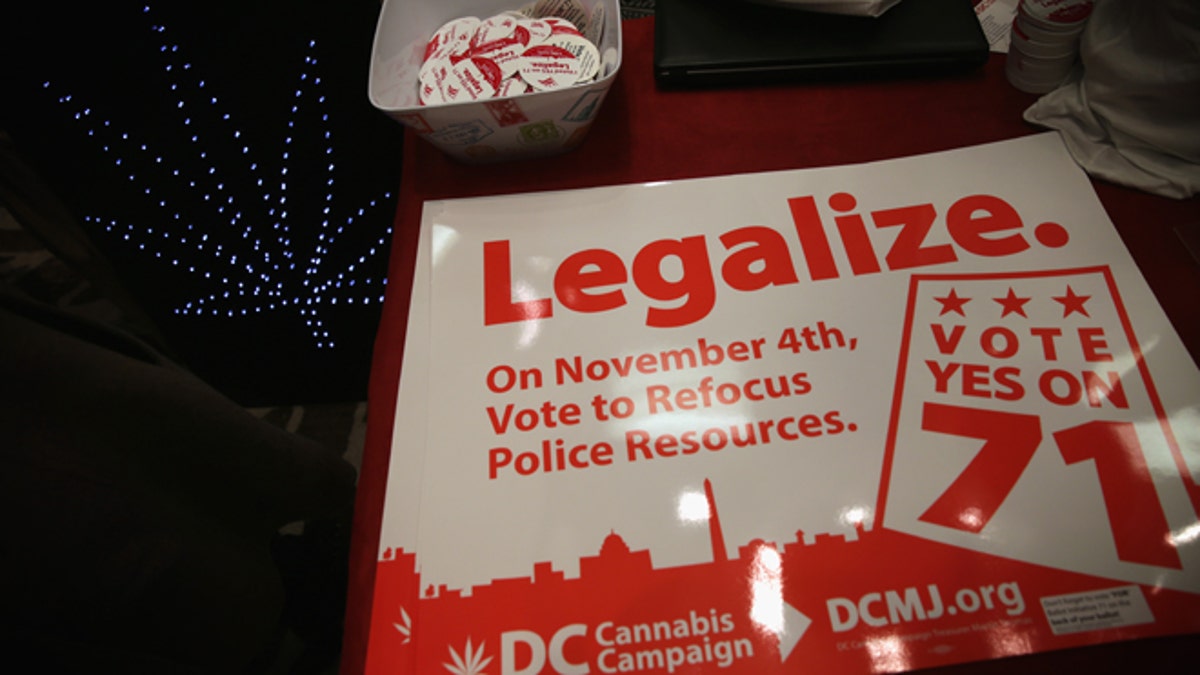
WASHINGTON, DC - FEBRUARY 28: Posters and stickers regarding Washington, DC's marijuana legalization are seen during a ComfyTree Cannabis Academy conference February 28, 2015 in Washington, DC. Attendees participated in the conference to gain knowledge on how to legally enter and operate in the cannabis industry. (Photo by Alex Wong/Getty Images) (2015 Getty Images)
The loosening of marijuana laws in Colorado and Washington may have created windfall profits in terms of tax dollars for those states and is a boon for licensed growers here, but it has created a converse effect for small-scale farmers south of the border.
In the Mexican state of Sinaloa, one of the country's biggest marijuana production areas, growers have reported that they have seen the price of their product drop precipitously over the last four years – from $100 per kilogram to $30 – and they believe the price plunge is caused by the availability of high quality, legal marijuana in certain U.S. states.
"People don't want to abandon their illicit crops, but more and more they are realizing that it is no longer good business," Juan Guerra, Sinaloa’s agriculture secretary, told the Los Angeles Times.
Mexico outlawed the cultivation of marijuana in the 1940s, under pressure from the United States, and, since then, the Mexican black market for the drug has only grown, empowering the country's already mighty criminal organizations.
For decades, both the U.S. and Mexico have worked to cut down the cultivation of marijuana with little results – research suggests that as recently as 2008 Mexico provided as much as two-thirds of the marijuana found in the United States. And it was difficult to get farmers to switch to other crops because drug trafficking organizations paid so much more for pot than farmers could get for more traditional crops.
- Best pix of the week
- How Chapo Guzmán broke out of Mexico’s highest-security federal prison
- Mexico’s narco-mausoleums make being dead look pretty swanky
- Mexico’s young elite flaunt their money, power on social media
- The NBA comes back to Mexico, a surprising hotbed of hoops fans
- The Avocadoes Of Michoacán
- Mexico considers decriminalizing marijuana – thanks to U.S. example
The loosening up of pot laws in states like Alaska, Colorado, Oregon and Washington, however, seems to have upended the drug market in Mexico and made marijuana much less lucrative for cartels and farmers alike. In the last seven years, Mexican marijuana has lost one-third of its market share in the U.S.
"Changes on the other side of the border are making marijuana less profitable for organizations like the Sinaloa Cartel," Antonio Mazzitelli, the representative in Mexico for the United Nations Office on Drugs and Crime, told the Times.
To counter that trend, the cartels have diversified their products to meet the growing taste in the U.S. for harder drugs like heroin and methamphetamine, but there is little small-scale subsistence farmers can do about it. Changing crops is a financial hit that could bankrupt many of them.
"If someone comes to buy it here, they want it really cheap," a 47-year marijuana farmer named Emilio told the L.A. Times. "Even though it's not really considered good business anymore here, there's nothing else to do.”
To make up for the lost income, some farmers have taken work as day laborers or in greenhouses growing tomatoes as part of a government plan to give farmers a chance at leaving the drug business. The work, however, is sporadic, and the money made pales in comparison.
Along with the availability of legal marijuana in the U.S., experts say the shrinking demand for Mexican pot also has to do with quality. Mexican marijuana is considered less potent than that cultivated in specialty grow houses and fields in the U.S. and Canada.
"Mexican marijuana is deemed lowest on the totem pole, and very few people who consider themselves aficionados or connoisseurs would admit to smoking it," said Daniel Vinkovetsky, who writes for High Times magazine under the name Danny Danko. "It's typically brown, pressed tightly together for transport and full of seeds."
"Access to better-quality American cannabis has led many to turn their backs on imports from Mexico and beyond," he added.
The demand for a drug with a higher concentration of THC – the chemical that gives pot its high – has led some cartels to attempt to enter the high-end marijuana market.
“Law enforcement reporting indicates that Mexican cartels are attempting to produce higher-quality marijuana to keep up with U.S. demand for high-quality marijuana," the 2015 National Drug Threat Assessment produced by the Drug Enforcement Administration noted.
There have even been some instances of high-quality marijuana being smuggled into Mexico from the U.S.
“I don't really have a sense of the amount or scale, but we have seen instances of it occurring," a DEA official told the Times.
The success in certain U.S. states with legalizing recreational marijuana use has even led to debate about the idea of emulating similar legislation in Mexico. The idea is controversial, however, given that the Mexican government has been entangled in a messy and violent drug war for almost a decade with little positive results, but a court ruling last month made medical marijuana legal in some instances.
"We should have taken up [legalization] a while ago," Mexican legislator Fernando Belaunzarán, who was one of the first politicians to bring up the legalization debate, told Fox News Latino. "Now we've done it poorly and late, while over [in the U.S.], there's already an industry, companies that even send marijuana to this country through our porous border."
